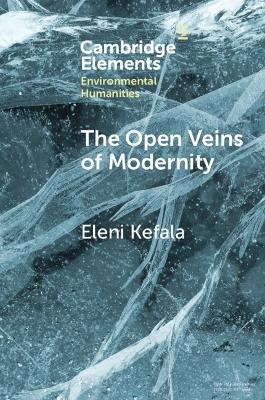
The Open Veins of Modernity
Ecological Crisis and the Legacy of Byzantium and Pre-Columbian America
Seiten
2024
Cambridge University Press (Verlag)
978-1-009-54710-9 (ISBN)
Cambridge University Press (Verlag)
978-1-009-54710-9 (ISBN)
- Noch nicht erschienen (ca. Dezember 2024)
- Portofrei ab CHF 40
- Auch auf Rechnung
- Artikel merken
This Element shows the ecological crisis due to modernity's colonial vision, of viewing Earth as natural resources and nonmodern cultures as passive or primitive. This led to the belief in intellectual maturity and infinite growth. This demands the need for decolonization of history and nature to mitigate humanity's existential threat.
The ecological crisis is the result of modernity's coloniality. The Moderns considered the Earth as 'natural resources' at their disposal. Their colonial vision of nature was complemented by that of nonmodern cultures like Byzantium and pre-Columbian America as passive or primitive, respectively. For the Moderns, the Byzantines were the 'librarians of humanity,' an inert repository of Greco-Roman knowledge, unable to produce their own. Byzantium's inertia was matched by that of nature, both reservoirs of epistemic and material resources. Thanks to those “librarians,” the supposedly inexhaustible supply of natural resources, and the epistemic and material riches of indigenous America, the Moderns believed they were inaugurating an epoch of intellectual maturity and infinite growth. Today, the enduring negative view of Byzantium and the ecological crisis confirm that we remain entangled in modernity's coloniality. We should decolonize both history and nature. To mitigate humanity's existential threat, modernity must be rethought and overcome.
The ecological crisis is the result of modernity's coloniality. The Moderns considered the Earth as 'natural resources' at their disposal. Their colonial vision of nature was complemented by that of nonmodern cultures like Byzantium and pre-Columbian America as passive or primitive, respectively. For the Moderns, the Byzantines were the 'librarians of humanity,' an inert repository of Greco-Roman knowledge, unable to produce their own. Byzantium's inertia was matched by that of nature, both reservoirs of epistemic and material resources. Thanks to those “librarians,” the supposedly inexhaustible supply of natural resources, and the epistemic and material riches of indigenous America, the Moderns believed they were inaugurating an epoch of intellectual maturity and infinite growth. Today, the enduring negative view of Byzantium and the ecological crisis confirm that we remain entangled in modernity's coloniality. We should decolonize both history and nature. To mitigate humanity's existential threat, modernity must be rethought and overcome.
1. Parode: the leaky jar of the modern; 2. Episode one: coloniality of human others; 3. Episode two: coloniality of nature; 4. Exodus: beyond modernity; References.
| Erscheint lt. Verlag | 31.12.2024 |
|---|---|
| Reihe/Serie | Elements in Environmental Humanities |
| Zusatzinfo | Worked examples or Exercises |
| Verlagsort | Cambridge |
| Sprache | englisch |
| Themenwelt | Naturwissenschaften ► Biologie ► Ökologie / Naturschutz |
| ISBN-10 | 1-009-54710-0 / 1009547100 |
| ISBN-13 | 978-1-009-54710-9 / 9781009547109 |
| Zustand | Neuware |
| Haben Sie eine Frage zum Produkt? |
Mehr entdecken
aus dem Bereich
aus dem Bereich
Lehrbuch zu Grundlagen, Technologie und Praxis
Buch | Hardcover (2022)
Hanser (Verlag)
CHF 48,95


